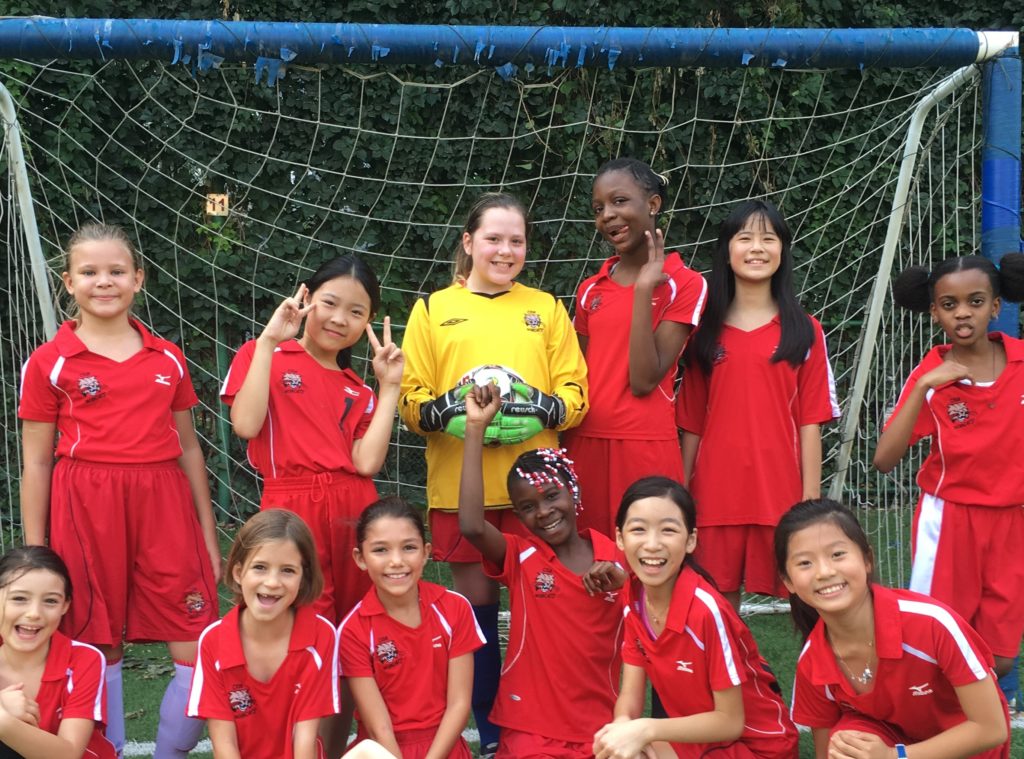Choosing a school for your kids can be difficult. One has to consider such factors as location, student-teacher ratios, staff stability, and more. While such factors weigh heavily on the minds of parents looking at schools in Beijing, these choices can be further compounded when searching for the right international school. Beijing has a wide variety of international schools with different missions, cultures, and curriculums for students. And, is the “international” school really international?
We recently connected with Cory Dickson to clarify which characteristics stack up to create the “international” aspect of an international school and what parents should watch out for when choosing a school for their kids. Dickson is the Head of Admission and Director of Public Relations at the Canadian International School of Beijing (CISB). He is also CISB’s former Middle Years Program and Diploma Program coordinator.

Students at CISB gathered playing soccer.
What should parents begin with when creating their list of potential international schools for their child to call a second home?
“To begin, international schools in Beijing have one of two licenses: One allows the international school to accept only foreign students, the other allows the school to accept both foreign students and Chinese nationals. It is important to find out which license the school holds to ensure your child qualifies for enrollment before beginning your search into a potential school.”
Are there any benefits to schools with different licenses?
“There’s no big benefit to one or the other. Some schools, because of their associations, have better reputations. But that doesn’t mean the local school isn’t going to offer everything the parents are looking for. Go see the local campus even if the reputation is not known.”
When they’ve narrowed down their list, what other things might parents consider?
“Curriculum should be one of the primary items on your international school checklist. Unlike publicly run schools, international campuses can implement and deliver their own courses. Although some schools are partnered with provincial/state/national curricula in other countries, others have developed or manipulated their own course offerings, which means it’s important to ask what’s being taught, how it’s being delivered and what, if any, accreditations the school has obtained. These accreditations can give you, and potential universities, reassurance in the school’s credibility.”

CISB students conducting a science experiment.
How widely do international schools differ and how?
“International schools come in all shapes and sizes. They can focus on a particular age group, language, or methodology. Some schools are part of an international collection of campuses, some are embassy or university affiliated, while others are independently owned and operated. The language of instruction (bilingual, English, or mother tongue focused), the makeup of the board of directors (parent led, family run, corporate sponsored), the fee structures, language requirements, teacher-student ratio, and other issues can vary dramatically from one school to another. It’s important to do your homework when beginning your search. Focus on the type of environment you want for your child(ren) and consider any potential international moves during their academic careers and potential post-secondary educational paths. There are lots of schools to choose from, so do your best to find the one that’s right for your family.”
On the topic of accreditations, how can parents confirm a school’s accreditation?
“There are a lot of accrediting bodies out there. Each one has its own application process and it can be a lot of work for a school to be become recognized or authorized. For many of the more reputable accrediting bodies, it can take years to obtain authorization and can require the school to divulge or alter everything from financial practices to academic policies. These same accrediting bodies will also do regular reviews to ensure that the school is continuing to maintain their expected standards. Some of the more popular accrediting institutes used in Beijing are the International Baccalaureate Organization (IBO.org), Council of International Schools (COIS.org), Western Association of Schools and Colleges (ACSWASC.org) and the Council of British International Schools (COBIS.org.uk). Most international schools will proudly wear their accreditation on their websites and a simple google search will help you to better understand what was required to obtain these authorizations.”
How important is accreditation? If a school is not accredited, should parents still consider it as an option?
“Yes, I do still think it’s important to check out those schools, especially even younger schools as well. The IBO requires a school to be in service for a few years before it can even apply for accreditation, and that can take about three years to get sometimes. So even if a school is not accredited now it may be soon or may have plans to in the near future. Accreditation won’t change what the school has to offer or the culture of the school. It’s just an added bonus if they have good accreditation and can help with students’ applications to universities to build credibility. It’s probably important to point out too that some schools may be well-known in Beijing but nowhere else. So it’s important to check out all campuses whether you’ve heard of them or not.”
Any last thoughts on Beijing’s International Schools?
As a parent looking for international schools you are very lucky to live in Beijing because there are many great options to choose from. So look at all of them, and good luck!
With this encouragement, parents can meet Cory Dickson and other CISB staff along with other Beijing schools at the 7th Annual Beijing International School Expo (BISE). The 2017 BISE will be held on February 18-19, 2017 from 10am-4pm at the Crowne Plaza Beijing Chaoyang U-Town. Find out more information about the event here.
-
2017 BISE: Take a Peek at the Schools Already Confirmed
Helping Children Connect: Forest School in Beijing
Location Matters: Does Distance to School Factor in When Picking a School?
What Parents Want From Schools at BISE
Making the Switch: Moving from BSB, Sanlitun to BSB, Shunyi
Ringing the Changes: Keystone’s Counselors Help With School Transition




